

Envision a world without batteries: no laptops, no phones, no spacecraft. We’d still be cranking automobile engines by hand, and our lifespans would undoubtedly be shorter due to the limitations of medical equipment.
The battery is truly a remarkable invention. In the early 19th century, Alessandro Volta developed the first batteries that continuously produced electricity by stacking discs of copper and zinc separated by a layer of cloth soaked in salt water. Shockingly, this humble setup was found to create a stable flow of electrons which could be harnessed by small electrical devices.*
Fast forward to the 21st century, and the flow of electrons has become so efficient and sophisticated that today’s batteries can power electric vehicles, data centers and entire power grids.
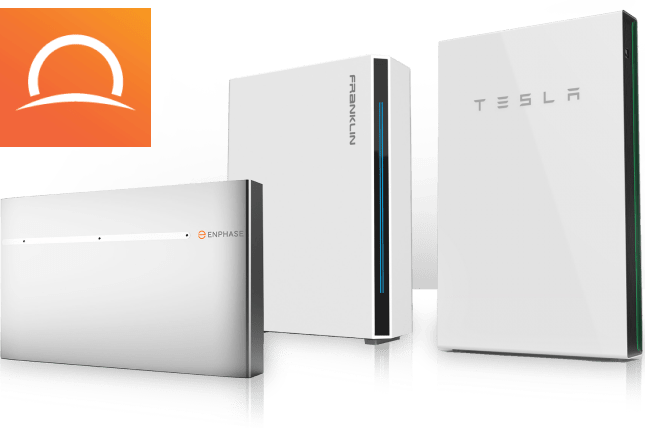
At its most basic level, a battery is a device that stores chemical energy and converts it into electricity on demand when a path for the electrons to flow is created. A chemical reaction occurs inside the battery, which involves the flow of ions between two electrodes — a material made of metal or another chemical compound.
As the ions flow from a negative electrode (anode) on one end of the battery to a positive electrode (cathode) on the other end, they pass through a medium called an electrolyte, which balances the charge. When this reaction increases the chemical potential energy, it charges the battery. When it decreases chemical potential energy, the battery is discharging.
Different electrodes and electrolytes create a variety of chemical reactions that determine how a battery cell works, the amount of energy it can store and its voltage.
Lithium-ion batteries are the most common type of solar battery, where multiple lithium-ion cells are combined with complex power electronics that control the charge and discharge, monitor safety and maximize performance of your home storage system.
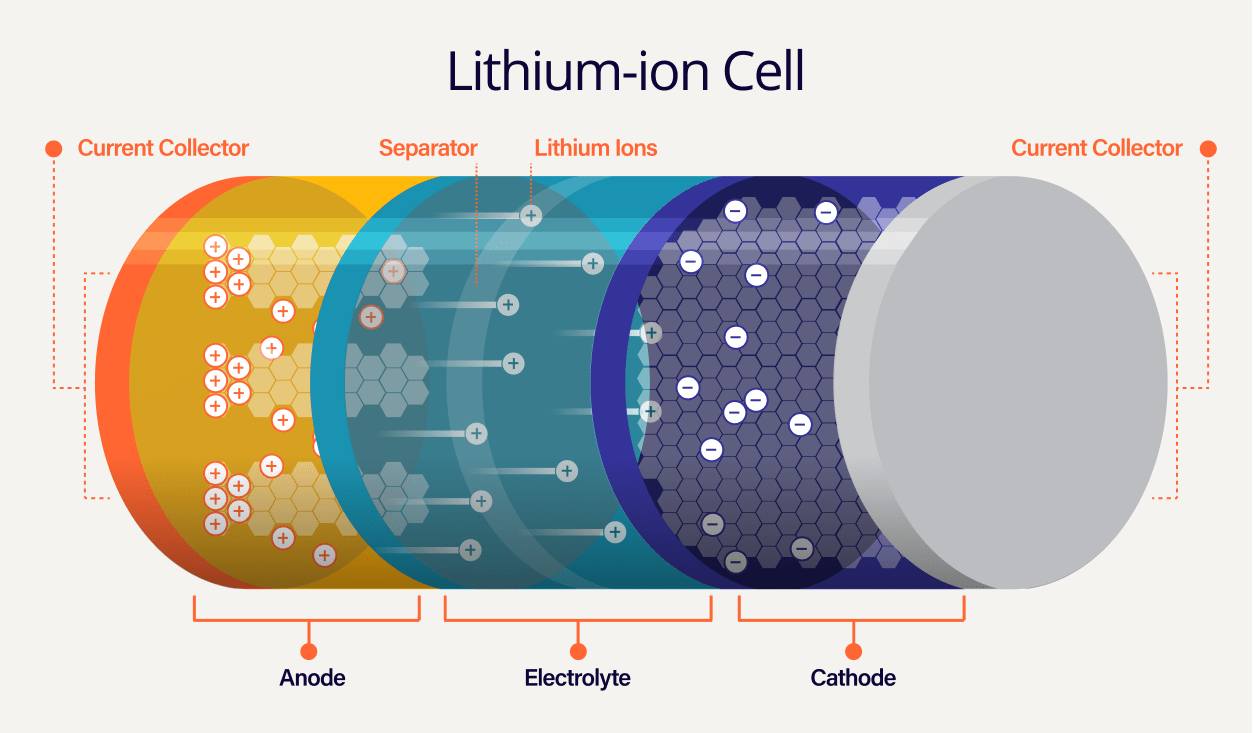
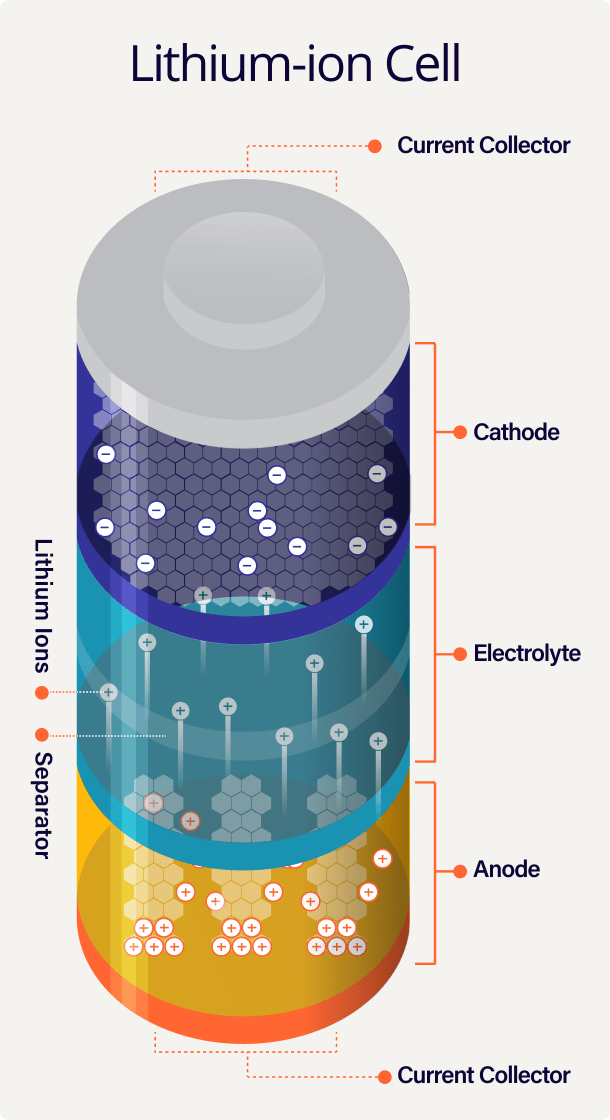
Lithium-Ion Batteries for PV
Lithium-ion batteries aren’t the only way to store solar energy. However, over the past few years, they’ve become the preferred option. For example, they are superior to traditional lead acid batteries due to their:
- Lighter weight: the raw materials in the chemical reaction weigh less
- Lower maintenance: don’t require scheduled cycling to maintain battery life
- Higher energy density: able to store more power without taking up more space
- Absence of toxic materials: don’t contain lead or cadmium
- Faster recharge rate: due to faster chemical reaction
- Better operation at a partial state of charge: don’t need to be fully recharged on a regular basis
- Increased lifespan: due to a higher cycle life and depth of discharge (DoD)
While lithium-ion batteries provide a longer-lasting solution compared to lead acid batteries, they do have higher initial costs. This is often justified by higher efficiency levels and better overall performance, but it’s a factor that should be considered.
What Does a Solar Battery Do?

Solar electric panels generate energy when the sun is out. Therefore, you can only use the clean energy from your solar system in real-time, during daylight hours.
A solar battery’s primary purpose is to enable you to store the surplus energy from your PV system and use it later when production is low or non-existent. This can occur during a rainy or cloudy day, after the sun goes down or during a grid interruption, if your battery is configured to provide backup power.
While battery systems paired with solar PV are referred to as solar batteries, they can charge from any electricity source: the grid, another renewable source like a wind turbine or even an EV with bidirectional charging.
The main advantage of a solar battery is to let your home use more of the solar energy it produces. If you don't have storage capabilities, any excess energy your PV system generates will be sent to the grid. While some utilities may issue credits on your electric bill for this excess solar, in many cases these credits are only a fraction of what your solar power is worth.
The upside is that you’re making more renewable energy available for other electricity customers and may receive a credit from your utility for the excess energy sent to the grid. The downside is that you’re not maximizing your solar investment if you’re paying more for electricity from the grid than for the energy you generate or get credited for by your utility. In this case, it’s far more economical to self-consume.
How Do Solar Batteries Work?
Your PV system generates energy in the form of direct current (DC), but your home appliances are built to work with alternating current (AC). Every PV system comes with a solar inverter that converts DC power to AC before sending it down a wire into your breaker box and into the rest of your home.
However, solar batteries can only store DC electricity. This means that any energy must be DC before it can be deposited into your storage system. If you don’t have a battery and want to send your excess production to the grid via net metering, your solar will run through another wire, into a net, bidirectional, or dual utility meter, and then out onto the grid.
When you add a battery to your PV system, any surplus solar energy will flow into your battery based on how the two are wired together. What happens to this soon-to-be-stored energy will depend on how your system and settings are configured. You can choose what percentage of backup power you want to reserve for a potential outage,* how much you wish to self-consume, and whether you want the battery to discharge during time-of-use (TOU) hours when rates are highest.
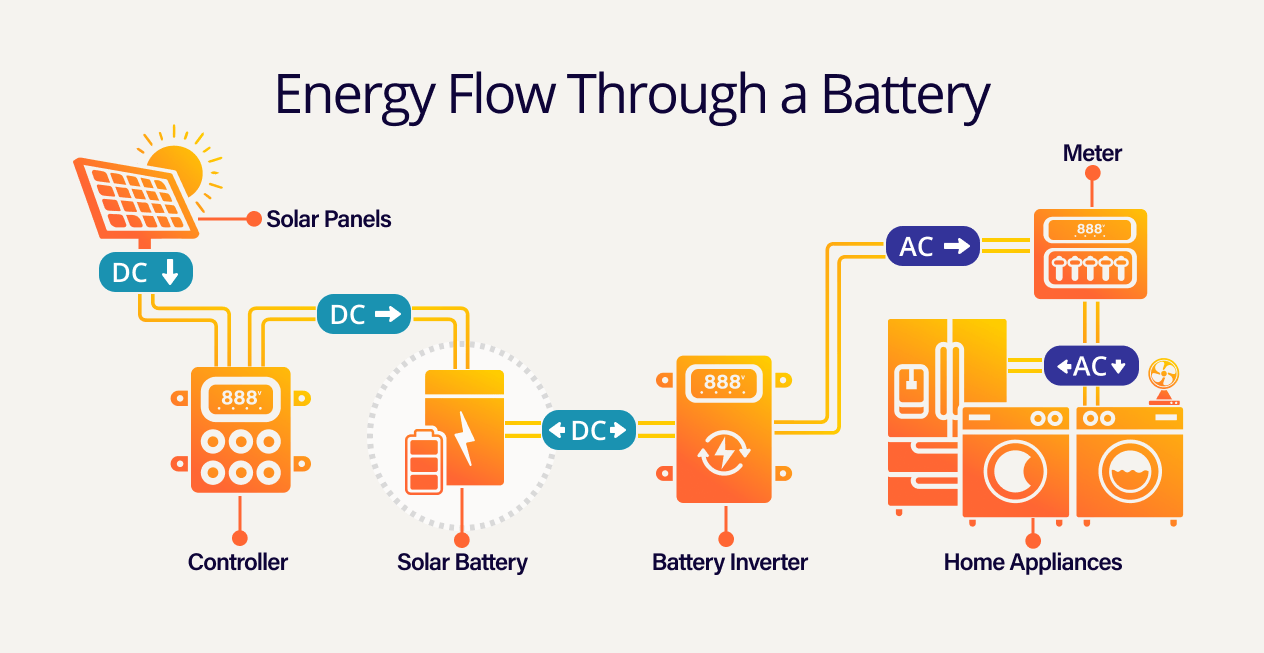
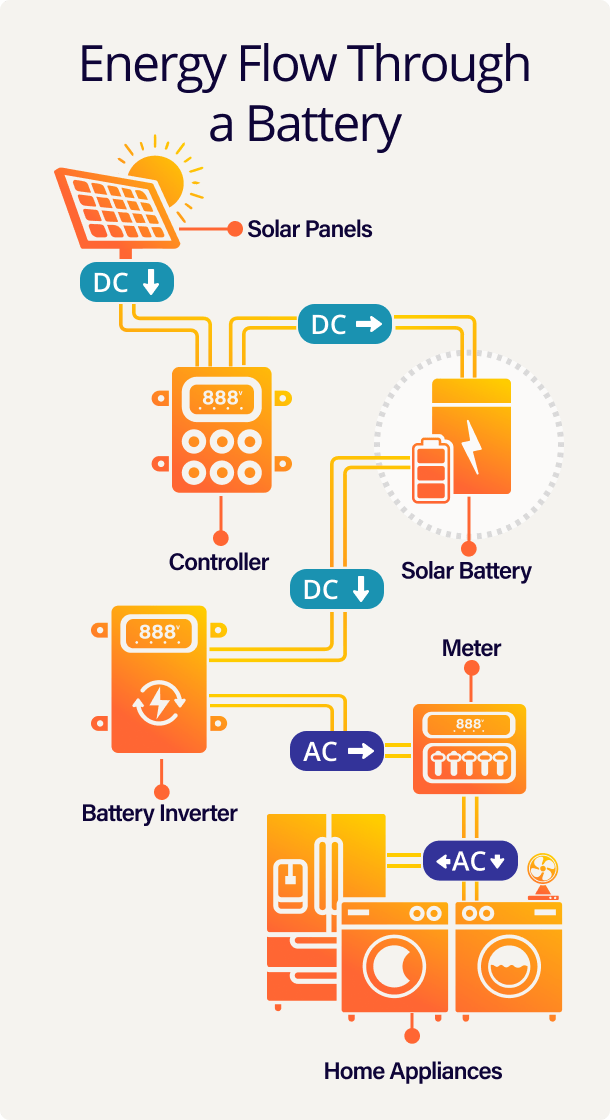
AC-Coupled vs. DC-Coupled Batteries
Your PV system can be electrically connected to your battery in one of two ways: via AC coupling or DC coupling. AC electricity flows both forward and backward, while DC electricity flows only in one direction. With both systems, solar is primarily used to power your home while any excess is sent to the battery. The main difference is whether the energy your PV system generates is inverted (turned from DC to AC) before or after being stored in your battery bank.
In years past, AC-coupled solar plus batteries were most often used with residential solar electric systems while DC-coupled solar plus batteries were reserved for off-grid installations. But today, advances in technology and standardizations in electronic equipment have made DC-coupling the solar and batteries widely available for grid-tied systems.
How Do Solar Batteries Work During an Outage?

Once your battery is installed, you can decide how your system provides power to your home based on three main settings: critical backup power,* self-consumption and TOU mode. The way you configure your battery will determine how it works.
Backup power mode*
Your battery waits to discharge until the grid goes down
Most homeowners decide what percentage of energy they want to be available if the grid goes down (usually between 20% and 100%) — this is your backup power reserve. If an outage occurs, your solar plus battery system will disconnect from the grid (or ‘island’) and begin using your backup reserve power to power to your critical loads subpanel (or whole household depending on the setup).
Self-consumption mode
Your battery discharges as soon as power is needed
After you establish your backup reserve, you can choose to have your battery discharge as soon as your solar production can’t meet your energy demand on its own — this will minimize the electricity you need from the grid. This mode will maximize the amount of solar energy you use in your home which minimizes energy imported from the grid.
Time-of-use (TOU) mode
Your battery discharges during your utility’s on-peak hours, when rates are highest
If your utility implements time-based rates, you can opt for a specialized form of self-consumption called TOU or time-based control. With this setting, your battery is pre-programmed with your utility’s rate structure and designed to dispatch during on-peak hours (often 4-9 pm), when utility rates are the highest.
Sunnova now offers RateGuard, a TOU-only battery for residents in certain California markets. This configuration offers a cost-effective way to store energy for nighttime use or to export to the grid during peak rates. It does not provide backup power, so it cannot offer protection during a grid outage.
Why Do You Need a Solar Battery?
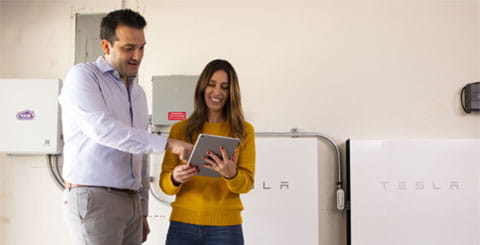
If you want to become more energy independent and lower your electricity costs while reducing your reliance on fossil fuels, a solar plus battery system is a worthwhile investment.
These intelligent systems can switch back and forth seamlessly between using real-time energy from your PV system, stored solar power and electricity from the grid. Not only can you keep your essential loads running during an outage,* but you can also avoid drawing from the grid when electricity prices are the highest.

